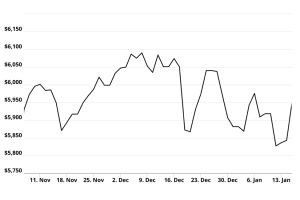
Social media stocks will continue to attract attention because of two critical factors: the 2024 election cycle and this year’s $251 billion market opportunity.
I take every forecast with a pinch of salt — however, an estimated 7.30% annual growth rate in total revenue (CAGR 2022-2027) is anticipated, translating into a projected market volume of $190 billion by 2027.
To take advantage of the market size, we will explore three social media stocks to buy trading below their 52-week highs with “buy” ratings. Let’s explore!
Meta Platforms (META)

Meta Platforms (NASDAQ:META) is up 37% in 2024, but analysts remain bullish. 43 analysts support a “Strong Buy” consensus rating, with 39 recommending a “Buy.” The stock’s price target averages approximately $531, which represents an almost 12% upside potential from its list price of around $475.
Llama 3-powered Meta AI illustrates how ongoing innovation boosts the upside. Its flexibility allows the clever AI tool to serve users on Meta’s platforms like Facebook, Instagram, WhatsApp and Messenger, in English in over a dozen countries.
Meta is also letting third-party developers and hardware specialists use its Meta Quest operating system to make mixed-reality apps more accessible.
What’s more, in the lead-up to the 2024 United States presidential election, Meta has detailed its policies to secure polls on various platforms and avoid any costly legal battles. This includes a big fact-checking network, strict ad constraints, significant security investment and new guidelines that require advertisers to disclose if they employ AI for social or political advertising
Finally, Meta’s last earnings report showed strong beats on the top and bottom lines. Annual first-quarter revenue rose 27% to $36.46 billion, and net income of $12.37 billion was more than twice the year before, but the price plunged 10% after the results on weak guidance, opening an attractive entry point for investors looking for social media stocks to buy.
Bumble (BMBL)

Bumble (NASDAQ:BMBL) is undergoing a transformation. Lidiane Jones is now CEO of Bumble, complimenting a number of new hires, such as David Ard as Chief People Officer, Ali Rayl as Chief Product Officer, Antoine Leblond as Chief Technology Officer and Selby Drummond as Chief Marketing Officer.
The shakeup at the top is working if you look at the latest financials; Bumble’s first-quarter sales rose 10.2% to $267.8 million, above Wall Street’s prediction of $265.5 million. The firm also announced above-expected profits. Earnings per share were 19 cents, vs 7 cents predicted.
In the first quarter, 4 million consumers paid for Bumble’s applications, up from 3.5 million last year. Some applications include Bumble, Badoo and Fruitz. Bumble uses community-based marketing to acquire users; it entails arranging events and engaging ambassadors who share the brand’s values to attract new users.
Bumble is also recognizing 2024 dating trends like “shared values,” and “rebelling against constant improvement rhetoric” to develop the app. Additionally, Bumble may reconsider its distinguishing trait of women making the first move to empower users. AI-enhanced user security and profile improvements are further additions.
Tencent (TCEHY)

Chinese conglomerate Tencent (OTCMKTS:TCEHY) holds some of the biggest social media apps in the country, with Weibo alone reporting 598 million monthly active users in December, up 11 million sequentially. But the jewel in TCEHY’s social media crown is WeChat, which boasts 1.3 billion monthly active users up from just 355 million users in Q4 2013.
Over and above that, the best part about investing in TCEHY is that you gain access to several important business lines with one stock. Its premium position in China and innovation in new areas, such as Tencent Hunyuan, a foundation model for AI, gives it a premium position among social media stocks to buy, illustrated by four consecutive earnings beats.
Tencent is also active in terms of industry partnership. It’s collaborating with Toyota (NYSE:TM) and Nissan (OTCMKTS:NSANY), two big Japanese companies, to improve AI use in the car industry.
In addition, Tencent has listed quantum computing, AI-driven industry growth, sustainable computing and other things as some of the top ten technological trends for 2024. These trends show Tencent’s view of the future of technology and how it will affect different fields and daily life.
The stock last closed at $47.63, perilously close to its 52-week high of $47.75, but the company’s decision to raise its dividend 42% and more than double its share repurchase commitment in 2024 more than offsets the bearish thesis.
On the date of publication, Faizan Farooque did not have (either directly or indirectly) any positions in the securities mentioned in this article. The opinions expressed in this article are those of the writer, subject to the InvestorPlace.com Publishing Guidelines.




